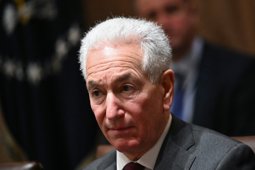
Appeals Court Voids 9/11 Plotter Plea Deal, Death Penalty in Play
Federal court voids plea deal for 9/11 mastermind, upholding the defense secretary’s authority over death penalty decisions.
Appeals Court Strikes Down Guantánamo Plea Deal
A divided federal appeals court in Washington, D.C., on Friday rejected a plea agreement that would have allowed Khalid Sheikh Mohammed, the alleged architect of the September 11 attacks, to plead guilty and avoid the death penalty. The ruling upholds the authority of the Secretary of Defense to decide whether capital punishment should remain an option in military commission cases.
The 2-1 decision from the D.C. Circuit Court came after former Defense Secretary Lloyd Austin withdrew the agreement, which had been approved by military lawyers and Pentagon officials. The deal would have imposed life sentences without parole on Mohammed and two co-defendants, thus removing the death penalty from consideration. Mohammed, a Pakistani national, is accused of planning and coordinating the 2001 attacks that killed nearly 3,000 people in New York, Washington, and Pennsylvania.
The panel found that Austin had clear legal authority to rescind the plea deal, as the terms of the agreement had not yet been fulfilled and the government lacked any viable alternative remedies. As a result of the court’s order, the planned sentencing of the defendants was canceled, giving the Biden administration time to determine how to proceed with the military prosecutions at Guantánamo Bay.
Judicial Opinions Highlight Legal and Procedural Divisions
Writing for the majority, Judges Patricia Millett and Neomi Rao explained that Secretary Austin’s delay in intervening was reasonable given the need to avoid unlawful influence over the proceedings. They noted that Austin waited to see the outcome of plea negotiations before deciding if intervention was warranted, especially in light of prior allegations of inappropriate influence in similar cases.
The judges emphasized that “the families and the American public deserve the opportunity to see military commission trials carried out,” underscoring the importance of public accountability and the legal process. “The Secretary acted within the bounds of his legal authority, and we decline to second-guess his judgment,” the opinion stated.
In a dissenting opinion, Judge Robert L. Wilkins argued that the court’s holding was overly broad and set a concerning precedent. Wilkins wrote that the government had not met the high standard required for such extraordinary legal relief, noting that there was no binding precedent directly supporting the majority’s position and that the military judge had properly considered the relevant promises in the plea agreement.
Future of 9/11 Trials Remains Uncertain
With the plea deal overturned, the fate of Khalid Sheikh Mohammed and his co-defendants remains undecided. The decision keeps open the possibility of capital punishment but also extends the already lengthy legal saga at Guantánamo Bay. The case continues to highlight the legal, ethical, and political complexities surrounding the prosecution of individuals accused of terrorism and war crimes in the U.S. military system.
The ruling is considered a temporary victory for the Biden administration, which has sought to navigate the challenges of military justice for high-profile terror suspects while balancing national security, due process, and the interests of victims’ families. As the legal proceedings move forward, further litigation and debate over the future of Guantánamo detainees and military commissions is expected.






